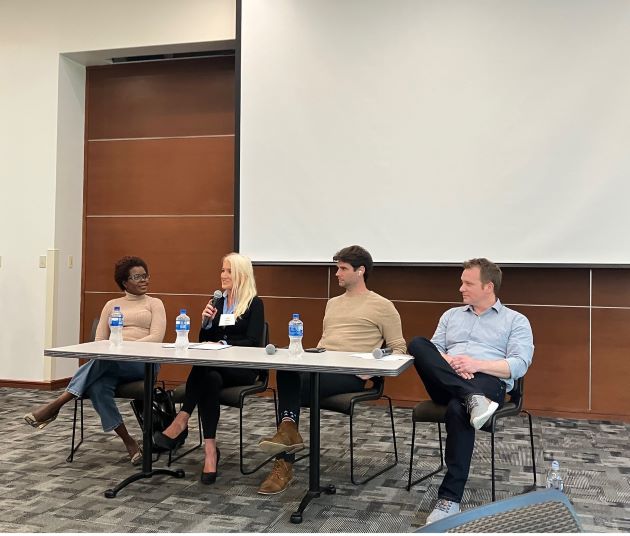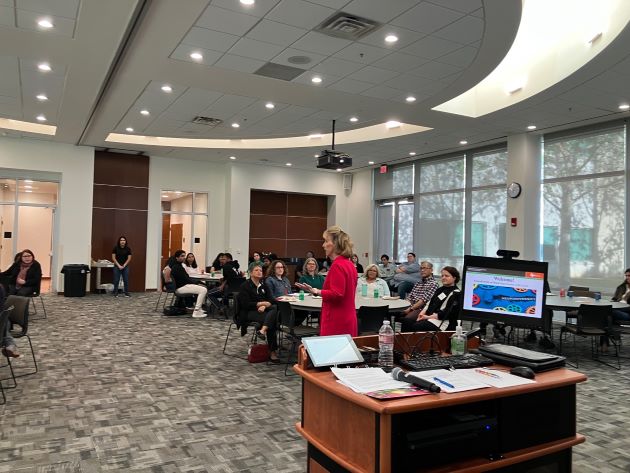A first-time event at the Naveen Jindal School of Management focused on a topic that many people know little or nothing about — neurodiversity.

The April 27 “Neurodiversity at Work” program was organized by Jindal School faculty members Dr. Dorothée Honhon, associate dean for diversity, equity and inclusion and a professor in the Operations Management Area, and Dr. Maria Hasenhuttl, assistant area coordinator of the Organizations, Strategy and International Management Area and professor of instruction.
Neurodiversity (also called neurodivergence) is a concept that considers individuals with differences in brain function and behavioral traits as part of a natural and valuable human variation instead of thinking of those differences as pathologies. The term is used within the context of autism spectrum disorder (ASD), dyslexia, attention-deficit/hyperactivity disorder (ADHD), Tourette’s syndrome, and other neurological or developmental differences.
The neurodiversity movement, which started in the 1990s, seeks to raise awareness of neurodiverse people and help others learn, understand and accept their differences. The benefits of recognizing the strengths of the neurodiverse and offering accommodations when needed help build a more diverse, functional society and a more productive, innovative workforce.
The Jindal School event featured a panel discussion about some of the challenges faced by neurodiverse individuals as well as some programs — primarily at large corporations — that address those issues.
Panel members were:
Nikki Drader, a doctoral student in management at the University of North Texas who spent 14 years in financial services. In her corporate career, she participated in neurodiversity hiring initiatives as a hiring manager and advocate for workplace inclusion. She also is conducting research in neurodiversity in the workplace and serves on the DEI Council of UNT’s G. Brint Ryan College of Business.
Geoff Barker, a JSOM MBA candidate who will start working at Toyota PPS (product/planning and strategy) this summer and has worked in transportation/logistics sales, supply chain and technology consulting, was diagnosed with ADHD in middle school. He also has high-frequency hearing loss in one ear that requires him to wear a hearing aid.
Gareth Shannon, a psychology student and research assistant at the University of Texas at Dallas, was diagnosed as neurodivergent as an adult. After his diagnosis, he left his career in executive protection to complete his degree. Currently, he is a senior undergraduate psychology student, an advocate for neurodiversity education in the workplace and an advocate for neuroinclusive hiring practices. He is a research assistant for Dr. Noah Sasson’s Social Cognition and Interaction in Autism lab at UT Dallas.
Tanya Tanis, the HCM-Diversity program manager for Goldman-Sachs. She has worked in the area of diversity, equity and inclusion for six years. She has a BBA and an MS in industrial organization psychology with a concentration in People Analytics and Diversity from Baruch College. She has lived across the globe to learn more about culture, languages, and human diversity as a passion.

“Events like this help us prepare students for the workplace and prepare the workplace for our students,” said Senior Associate Graduate Dean Dr. Monica Powell said in opening the program.
A conservative estimate of the unemployment rate among neurodiverse individuals is 30%-40%. A lack of understanding and acceptance by prospective employers and co-workers is one of the primary reasons. While some large corporations, such as Goldman Sachs, JPMorgan, Microsoft, Dell, etc. have programs in place to help those employees be successful, that is not the case in most organizations.
![[descriptive alternative text]](/jindal/files/2023/05/maria_hasenhuttl_and_dorothee_honhon_630x529.jpg)
“This event is about starting a conversation,” said Hasenhuttl. “We are at the beginning of this journey to create more neuro-inclusive workplaces. There is a lot of education and discussion that needs to happen.”
There are currently no programs at UT Dallas that specifically help neurodivergent students find employment, but that is not unusual, according to Honhon.
“There is very little attention to this issue in the U.S.,” she said. “The business community is in the lead, but there is still a stigma attached.”
The event was neurodiversity friendly. A quiet room was provided and attendees were told to feel free to stand, pace, or walk around the room as needed.






